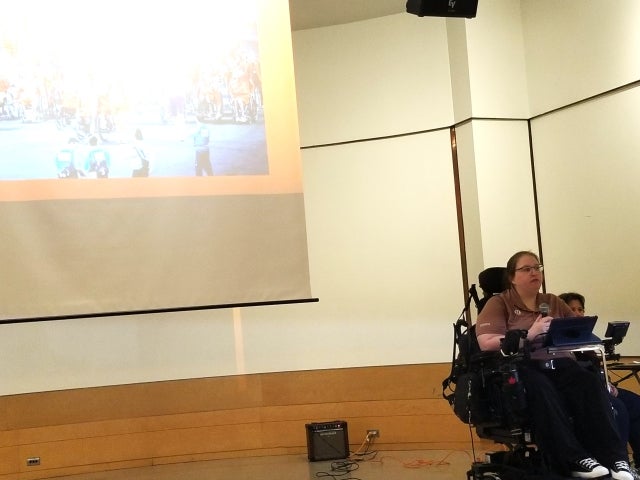Three-time Paralympian speaks at Branches of Belonging event

Congregation Dorshei Emet’s Branches of Belonging event was rescheduled to April 3 after a snowstorm led to its cancellation during Jewish Disability Awareness, Acceptance and Inclusion Month (JDAAIM). All who attended, however, agreed it was worth the wait. Featuring three-time Paralympian Alison Levine, the audience also took part in breakout sessions discussing living - and thriving - with difference, led by members of the community.
The program was made possible by Federation CJA, and “supports meaningful initiatives that celebrate and strengthen our commitment to inclusion,” explained Oria Lissak, the Congregation’s program director.
Levine’s keynote presentation “Loving Life, Wheelchair and All,” covered both triumphs and challenges of living with a rare degenerative neuromuscular disorder. Despite significant setbacks, she “is one of the top boccia competitors in the world right now,” according to the Canadian Paralympic Committee. Beyond her Paralympic record, Levine has podiumed in world cups and championships. She won gold at the 2023 Parapan American Games in BC4 Pairs and Singles and, in 2022, took home the gold at the São Paulo Americas Regional Championships.
She reflected on how the world of adapted sports provided her with newfound skills to become a competitive athlete, and most importantly, find a community. While she tried wheelchair basketball and sledge hockey, her ultimate love was wheelchair rugby, which she described as full, head-on physical contact.
“I wasn’t that disabled kid anymore,” Levine recounted. “I was an athlete. I had an identity more than ‘that person in a wheelchair.’”
As her condition changed, she switched to boccia; a precision ball sport, and it is there that she has made her official mark on the world stage.
“Boccia is a game that is won by millimeters,” Levine explained. “No matter your abilities, it only takes one ball to make a difference.” The sport requires extreme muscular control and strategizing, all the more challenging for athletes like her, whose physical condition keeps changing and who has to continually adapt rather than perfect their technique (ex: changing from throwing underhand to overhand).
When asked how she keeps up such a resilient attitude, she replied, “It really is a conscious choice - life is what you make of it. When you have been given a pretty devastating diagnosis, you just want to pull the covers over your head and say, ‘I’m done,’ and there are days like that.” While most take their physical health for granted, she added, “I don’t wait. I seize the opportunities and live my life fully.”
Levine attributes much of her attitude to her family and the Paralympic community. “Sports gives me a sense of stability, something I can anchor onto when my world is constantly changing. My focus shifted from obstacles to opportunities, and the future looked a lot less scary.”
The keynote address was followed by breakout sessions. Wendy Singer (managing editor of Inspirations newspaper) facilitated a workshop on the joy of accessibility, explaining how both a positive emotion like laughter and breaking down barriers to inclusion can unite people of all abilities. Next, Erika Tencer and daughter Tova Stolovitsky described resources such as visual schedules they use to assist Tencer’s younger daughter Atara, who has Down Syndrome and is non-speaking. In an activity intended to demonstrate alternative methods of communication, participants introduced themselves using American Sign Language, pantomiming a hobby or interest.
Finally, Josh Mandelker shared his experiences as an autistic adult employed at Marché Central’s RONA hardware store. “For a person who is neurodiverse to be able to work well, they need an employer who is willing to accommodate their needs, and an integration worker who can help speak on your behalf,” he said. For employers considering hiring those with different abilities, Mandelker advised, “If you take the time, we can become the best employees you will ever have.”
When reflecting on her career, Levine mused, “If I could speak to my early self, I would say; ‘I will be okay even if my life isn’t going to be what I would have thought. I will have the power of sport and my community to be the best me I can be.” Her world-class medals prove that - and more.









